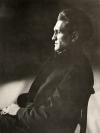Biography
George was born in Bingen in Germany in 1868. He spent time in Paris, where he was among the writers and artists who attended the Tuesday soireés held by the poet Stéphane Mallarmé. He began to publish poetry in the 1890s, while in his twenties. George founded and edited an important literary magazine called Blätter für die Kunst. He was also at the center of an influential literary and academic circle known as the Georgekreis, which included many of the leading young writers of the day, (e.g., Friedrich Gundolf and Ludwig Klages). In addition to sharing cultural interests, the circle reflected mystical and political themes. George knew and befriended the "Bohemian Countess" of Schwabing, Fanny zu Reventlow, who sometimes satirized the circle for its melodramatic actions and views. George was identified with an extreme conservatism in politics.[citation needed] He was a homosexual, and led, and exhorted his young friends to lead, a celibate life.
In 1914 at the start of the war he foretold of a sad end for Germany, and between then and 1916 wrote the pessimistic poem Der Krieg (The War). The outcome of the war saw the realization of his worst fears.
In 1933 after the Nazi takeover Joseph Goebbels offered him the presidency of a new Academy for the arts, which he refused. He also stayed away from celebrations prepared for his 65th birthday. Instead he travelled to Switzerland, where he died near Locarno. After his death, his body was interred before a delegation from the National Socialist government could attend the ceremony.
George's poetry is characterized by an aristocratic and remote ethos; his verse is formal in style, lyrical in tone, and often arcane in language, being influenced by Greek classical forms, in revolt against the realist trend in German literature at the time. Believing that the purpose of poetry was distance from the world?he was a strong advocate of art for art's sake ?George's writing had many ties with the French Symbolist movement and he was in contact with many of its representatives, including Stéphane Mallarmé and Paul Verlaine.
George was an important bridge between the 19th century and German modernism, even though he was a harsh critic of the then modern era. He experimented with various poetic metres, punctuation, obscure allusions and typography. George's "evident homosexuality" is reflected in works such as Algabal and the love poetry he devoted to a gifted adolescent of his acquaintance named Maximilian Kronberger, whom he called "Maximin", and whom he identified as a manifestation of the divine. The relevance of George's sexuality to his poetic work has been discussed by contemporary critics, such as Thomas Karlauf and Marita Keilson-Lauritz.
Algabal is one of George's best remembered collections of poetry, if also one of his strangest; the title is a reference to the effete Roman emperor Elagabalus. George was also an important translator; he translated Dante, Shakespeare and Baudelaire into German. ..






